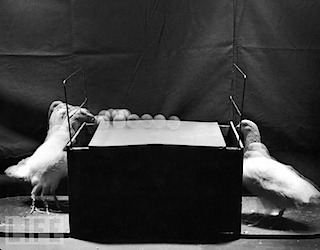During the course of this lecture we covered 5 main psychological learning theories.
- S-R Theory
- Operant Learning
- Cognitive psychology in learning
- Social Learning Theory
- Social-Cognitive Learning Theory
All of these theories are used one way or another in teaching paradigms. Sometimes not appropriately! The learning theories definitely point to different 'schools' of psychology.
Behaviourism
In it's most radical form, behaviourists state that what we actually feel, or think inside our heads is completely unimportant and in fact does not really occur except as a sort of accident. As such one should only look at the kind of 'stimulus' that elicits a response according to the various laws of association and the shaping that occurs due to operant conditioning which is a result of different reward (or punishment) schedules.

Pigeons playing ping pong (source)
If there's one thing that I think teachers should take away from this is that 'punishment' or 'negative reinforces' only work under very controlled conditions:
- the negative reinforcement has to be applied immediately (otherwise the learned behaviour is 'extinguished' very quickly.
- it has to be applied with an extremely high frequency schedule - in other words it has to be applied pretty much each and every time - no exceptions.
- the negative reinforcement has to be sufficiently 'negative' so that the children will actively avoid it. Folks we're taking being branded with glowing irons, or having the soles of your feet beaten, or splints inserted in your fingernails. I presume that none of you come across (nor would you entertain) such behaviour.
On the last point, how many children have you come across who get sort of 'immune' to any scolding (which is a negative reinforcement) that a teacher dishes out?
So good example of a negative reinforcement that does not work just by itself - giving out detention. The 'punishment' is applied long after the offence has occurred. I ask you, can you guarantee that each and every similar offence by all children is always caught; as well as whether the actual detention is really that terrible a punishment?
Cognitive Psychology
I've always thought that cognitive psychology was really a 'response' (ha!) to the stimulus of behaviourism - in other words there were psychologists who just plain didn't like the fact that the behaviourists treated humans (and animals) as simply black boxes. This theory is the MOST dominant one in psychology today. The official text book recommended is very heavily based in cognitive psychology. Massively over simplified but cognitive psychology believes that we 'think' by making constructions of the world in our heads and that we do mental operations on this mental model. Teaching under a cognitive psychological paradigm, think that children will learn best by allowing them to explore the world as much as possible so that they can actively 'construct' their conception of the world.
Trait Theory
This is a personality theory but is has it has a strong basis in biological theory along the notion we have long standing aspects about our personality that will predispose us to be extraverted, obedient, open-minded, neurotic and conscientious. This of course doesn't tell us much the actual learning process, but it's partly from this theory that the social-cognitive theory comes from (the link takes you to the person that proposed the fusion of trait theory and behaviouristic principles along with cognitive psychology).
Humanism
This is probably the closest modern day version to the original 'introspection' that was part of the original psychology laboratories in the 19th century. Social Learning Theory is very much steeped in humanistic psychological principles.
Notes
I've got some links to take you to the psychology wiki pages to help with more links (some of you might also like to try Wikipedia). The notes for this lecture can be found here.